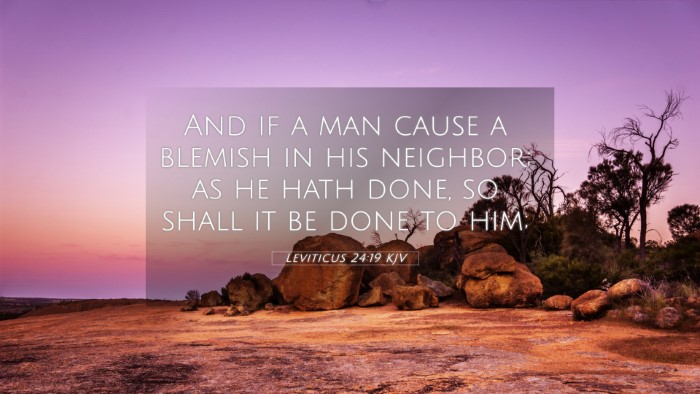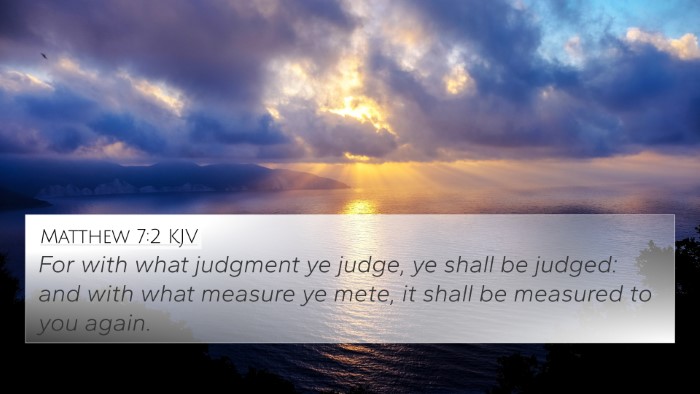Understanding Leviticus 24:19
Leviticus 24:19 states:
"If anyone injures his neighbor, as he has done, it shall be done to him."
This verse is a part of the Holiness Code presented in Leviticus, highlighting the principle of justice in the community of Israel. The passage illustrates a foundational legal principle often referred to as the law of retaliation, or lex talionis. Below is a combined interpretation from prominent public domain commentaries.
Commentary Insights
Matthew Henry's Commentary
Matthew Henry emphasizes the nature of divine justice encapsulated in this verse. He articulates that this law serves as a deterrent against wrongdoing and reaffirms the sanctity of personal rights. The severity of the penalty is meant to provide a clear boundary for behavior, ensuring that the punishment is proportional to the injury caused. Henry notes that this principle adapts to the community's moral fabric, urging individuals to consider the weight of their actions.
Albert Barnes' Commentary
Albert Barnes expands on the theme of equity and justice in Leviticus 24:19. He posits that the verse reveals God’s desire for balance in societal interactions, pointing out that this principle of "an eye for an eye" was rooted in common sense justice. Barnes asserts that it promotes personal responsibility and reconciliation. He further draws attention to the way this principle was meant to limit excessive punishment, advocating for fairness in every legal situation, thus avoiding the escalation of vengeance.
Adam Clarke's Commentary
Adam Clarke approaches this verse with an emphasis on its New Testament implications. He discusses how while the Old Testament law espoused the principle of strict reciprocity, Jesus in the New Testament teaches a higher standard of love and forgiveness (see Matthew 5:38-39). Clarke reminds readers that the heart of the law seeks to nurture community rather than foster hostility, indicating that while the Old Testament provides a foundational understanding of justice, the New Testament redeems that into a call for grace.
Cross-References and Thematic Connections
This verse connects deeply with various other Scriptures that expound on justice, personal accountability, and the moral fabric of society. Below is a list of relevant Bible verses:
- Exodus 21:24-25 - "Eye for eye, tooth for tooth..." a foundational reference to the principle of retribution.
- Deuteronomy 19:21 - Emphasizes proportional justice as well, ensuring that crime is addressed justly.
- Matthew 5:38-39 - Jesus’ interpretation of the law, which introduces the concept of love and forgiveness over retaliation.
- Romans 12:19 - Encourages believers not to take revenge, affirming God’s role as the ultimate judge.
- Galatians 6:7 - A reminder that a man reaps what he sows, focusing on personal accountability.
- James 2:13 - Affirms the importance of mercy in the face of judgment, highlighting the theme of compassion.
- Proverbs 24:29 - Warns against seeking revenge, encouraging a wise approach to conflicts.
- Leviticus 19:18 - "You shall love your neighbor as yourself," establishing the moral ground of human interactions.
- Micah 6:8 - Calls for justice, mercy, and walking humbly with God as the true essence of obedience.
- 1 Peter 3:9 - Promotes a response of kindness rather than retaliation, echoing the ideals found within the teachings of Jesus.
Conclusion
Leviticus 24:19 reflects an essential principle of justice and personal accountability that runs throughout Scripture. Researchers and Bible students benefit from utilizing cross-referencing tools and resources to explore the intricate web of connections between these verses. Tools such as Bible concordance and Bible cross-reference guide can aid in a deeper understanding of these themes. A comprehensive approach that includes exploring Thematic Bible verse connections and Scriptural cross-referencing allows for fruitful study and discernment of how the Bible dialogues within itself.
By examining this verse, believers gain insights not only into the nature of divine justice but also into the broader biblical call toward love, mercy, and restoration in human relations. Such understanding enhances one’s spiritual walk and enriches communal ties.





